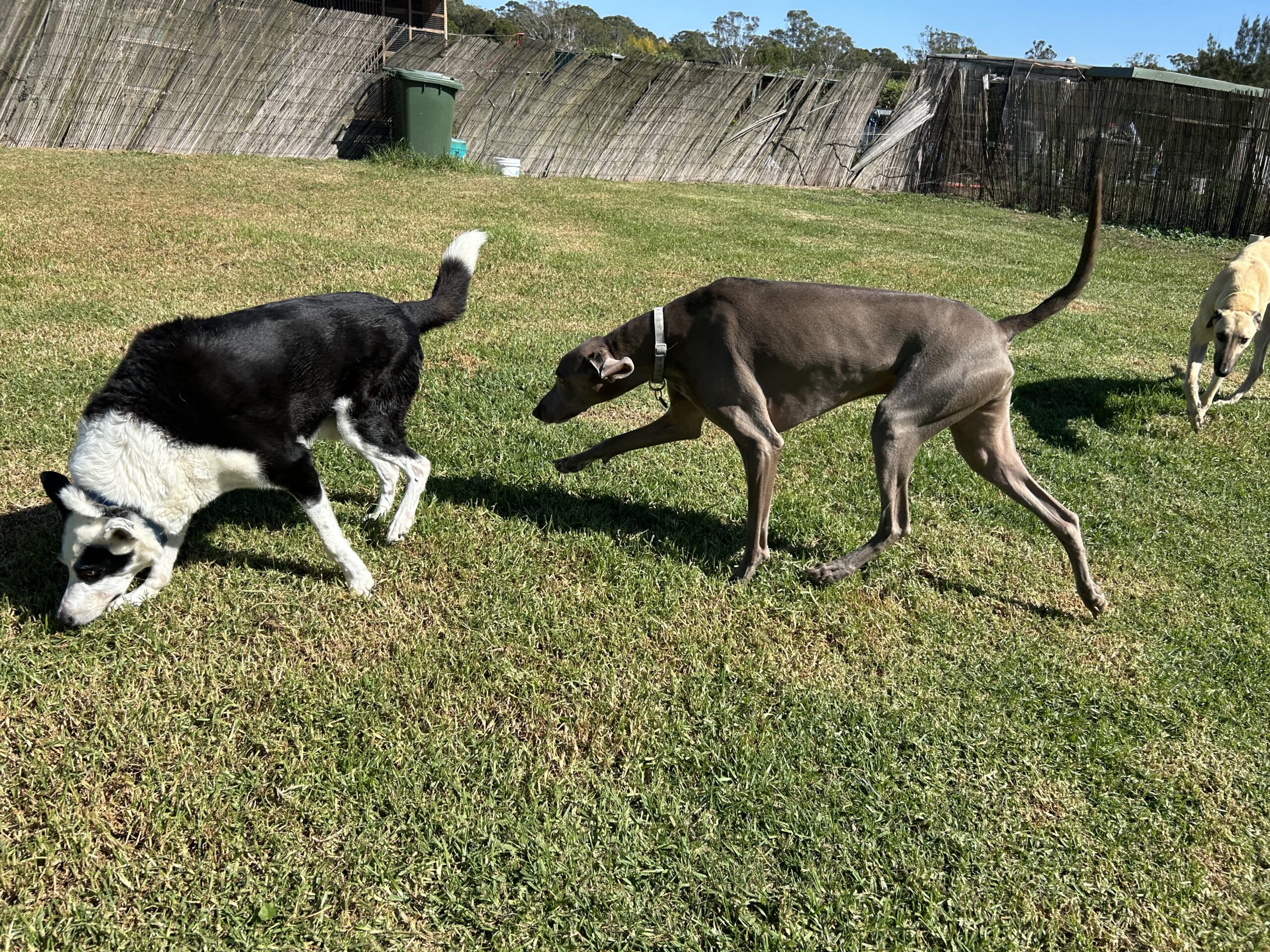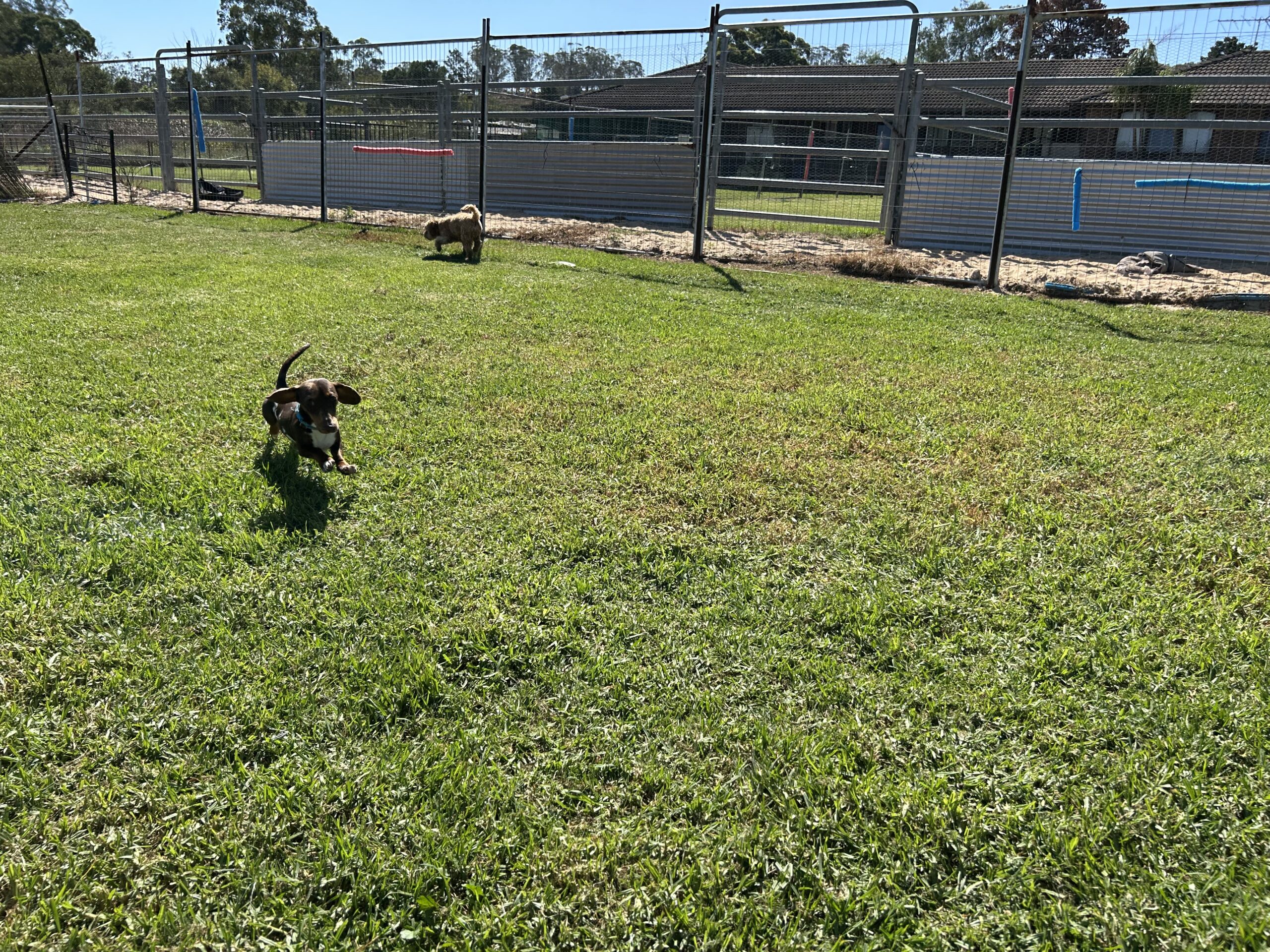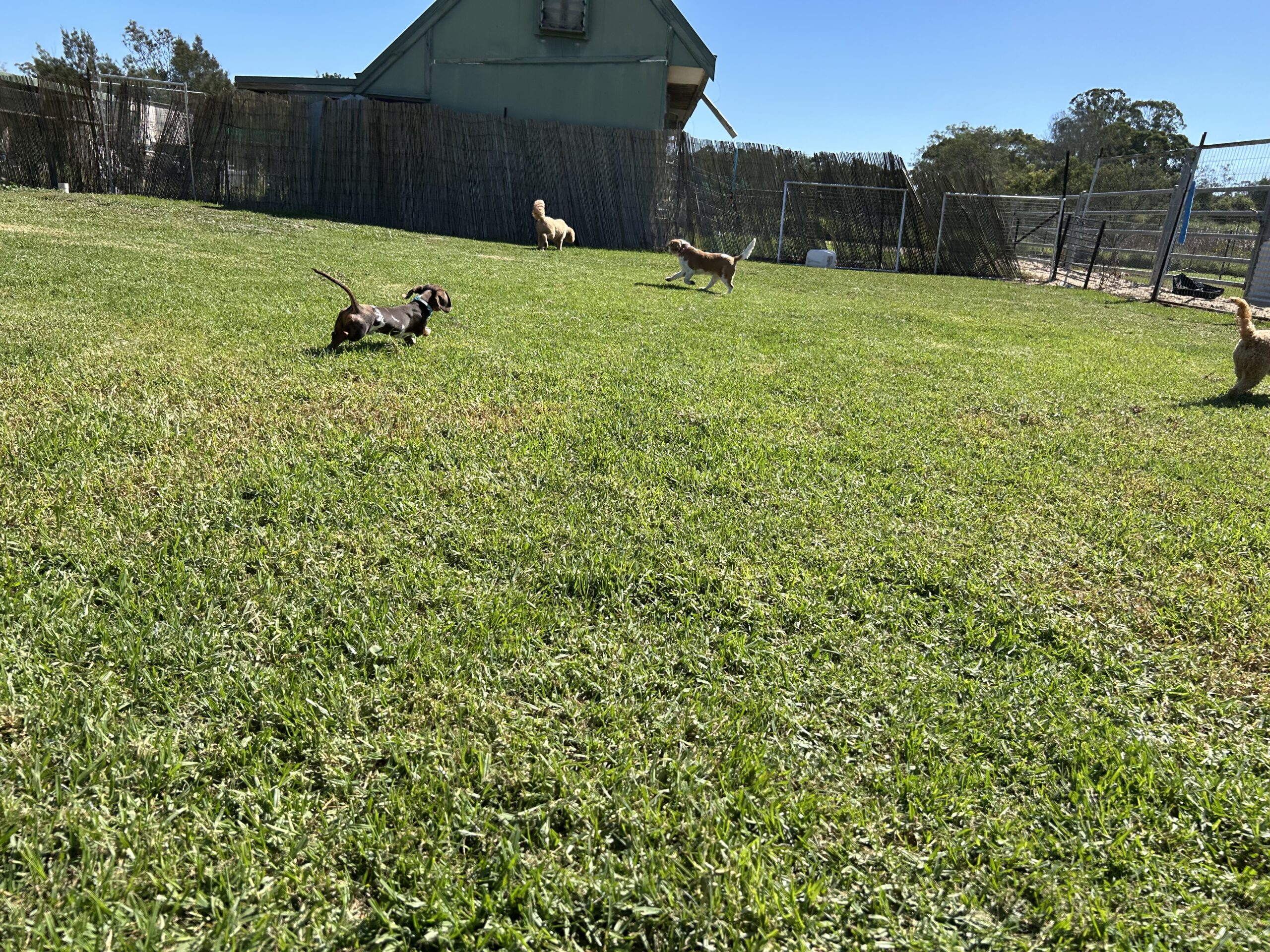Reinforcing Dog Training: Joyful Consistency Through Professional Daycare
Reinforcing dog training through skilled daycare professionals creates seamless consistency between home and care environments, strengthening boundaries and accelerating skill development. 
Key Takeaways: Professional Boundary Reinforcement at Daycare
| Essential Training Benefits | Why It Matters |
|---|---|
| Reinforcing dog training requires professional consistency | Prevents confusion from inconsistent expectations |
| Skilled staff understand learning principles beyond basics | Science-based reinforcement rather than casual handling |
| Daily practice significantly accelerates training progress | Multiple repetitions strengthen neural pathways |
| Different handlers generalize learned behaviours | Skills become handler-independent rather than person-specific |
| Group settings create real-world training applications | Commands function even with distractions and excitement |
| Professional progress tracking identifies training gaps | Systematic approach catches inconsistencies early |
| Complementary training builds comprehensive command sets | Home and daycare training build different but compatible skills |
| ️ Clear boundaries prevent regression during owner absences | Consistency prevents the “holiday effect” when away from home |
“The Invisible Sabotage: Is Your Dog’s Progress Being Undermined When You’re Not There?”
Has your dog’s training progress reached frustrating plateaus despite your diligent efforts? Perhaps commands that function perfectly at home mysteriously “disappear” in other environments, or behaviours you’ve worked hard to eliminate seem to resurface regularly? Many devoted owners experience training regression without realising the culprit might be inconsistency outside the home environment.
Research reveals that dogs receiving mixed messages from different caretakers can experience “training interference”—a phenomenon where conflicting expectations create confusion that manifests as apparent stubbornness or regression. Even more concerning, a groundbreaking study from the University of Melbourne found that dogs experiencing inconsistent boundaries from multiple handlers showed a 64% slower rate of reliable skill acquisition compared to those receiving uniform reinforcement.
The financial and emotional costs are significant: professional trainers estimate that inconsistent care environments can double or triple the time required to establish reliable behaviours, adding thousands to training investments. The good news? Quality facilities focused on reinforcing dog training can systematically support and enhance your training efforts through evidence-based consistency protocols.
Daycare Boundary Enforcement Through Professional Consistency
Reinforcing dog training programs operate on a fundamental behavioural principle: learning requires consistent reinforcement across environments and handlers to become truly reliable. Unlike casual care settings where training may be undermined, quality daycare boundary enforcement facilities implement sophisticated consistency protocols that strengthen rather than weaken home training.
“Most owners dramatically underestimate how fragile new behaviours are,” explains Dr. Emma Richardson, veterinary behaviourist. “It takes remarkably little inconsistency to undermine weeks of careful training. Professional reinforcing dog training programs provide the environmental consistency that’s essential for developing reliable behaviours.”
Premier daycare boundary enforcement facilities implement evidence-based strategies including:
- Comprehensive intake assessments documenting current training status
- Custom consistency protocols matching home training methods
- Strategic reinforcement of core commands throughout daily activities
- Professional staff trained in learning theory beyond basic handling
- Systematic boundary maintenance preventing regression
- Regular skill practice integrated into daily routines
- Documentation systems tracking training progress and challenges
These aren’t casual approaches but carefully orchestrated behavioural interventions designed by canine education specialists. The consistency provided through reinforcing dog training programs accelerates skill development while preventing the common “one step forward, two steps back” pattern many owners experience.
Daycare Boundary Enforcement: The Learning Science of Consistent Reinforcement
Reinforcing dog training programs utilise cutting-edge understanding of canine cognition to create reliable behavioural patterns. Research from the University of Sydney’s Animal Learning Centre found that dogs receiving consistent reinforcement from multiple handlers demonstrated 76% greater command reliability and 82% faster generalisation to new environments compared to those experiencing variable expectations.
During professionally designed daycare boundary enforcement interventions, your dog’s learning systems undergo sophisticated development:
- Formation of generalised responses that function with any handler
- Strengthening of neural pathways through consistent repetition
- Development of reliable performance even with environmental distractions
- Establishment of clear behavioural boundaries preventing confusion
- Creation of predictable expectations supporting confidence
“These reinforcing dog training techniques create fundamental improvements in behavioural reliability,” notes canine education specialist Dr. James Wilson. “In quality daycare boundary enforcement settings, we’re not just maintaining skills but actively strengthening them through strategic consistency that supports home training efforts.”
Is Your Dog’s Training Being Undermined? Take This Assessment:
- Does your dog seem to “forget” commands in environments outside your home?
- Do behaviours you’ve worked to eliminate reappear after time in others’ care?
- Does your dog test boundaries more intensely after returning from care?
- Has your training progress plateaued despite continued efforts?
- Does your dog respond differently to commands depending on who gives them?
If you answered “yes” to three or more questions, your dog likely experiences significant training inconsistency—precisely the issue that specialised reinforcing dog training programs address through professional consistency.
Specialized Techniques for Training Reinforcement at Quality Daycares
Premier reinforcing dog training facilities implement evidence-based protocols designed specifically for maintaining and enhancing home training. These aren’t recreational programs but sophisticated educational interventions created by canine behaviour specialists.
“The difference between casual care and professional reinforcement is profound,” explains Dr. Sarah Williams, canine learning psychologist. “Proper daycare boundary enforcement programs systematically support home training through deliberate consistency rather than allowing skills to deteriorate while owners are away.”
Leading reinforcing dog training programs feature techniques such as:
Integrated Command Practice
Strategic incorporation of training cues into everyday activities—creating natural practice opportunities that strengthen skills without formal training sessions.
Distraction Proofing Development
Carefully managed group environments providing graduated challenge levels for practising commands—building reliability that transfers to real-world situations.
Boundary Clarity Systems
Consistent application of established limits preventing erosion of rules—maintaining the clear expectations essential for behavioural reliability.
Handler Transition Protocols
Structured handover procedures ensuring all staff reinforce identical behaviours—preventing the confusion caused by shifting expectations between different caregivers.
Case Study: Bailey’s Transformation Through Training Reinforcement
Before: Bailey, a 2-year-old Labrador mix, epitomised inconsistent training despite significant investment in professional instruction. His family reported that commands worked well at home but disappeared in other settings, and hard-earned boundaries seemed to require constant re-establishment after any time in others’ care. Despite excellent progress with his trainer, reliable real-world behaviour remained elusive.
The Reinforcing Dog Training Program: Bailey began attending a specialised daycare boundary enforcement program three days weekly. Staff conducted an initial assessment and created a personalised consistency protocol:
- Week 1: Documentation of all current commands, boundaries, and training methods
- Weeks 2-3: Systematic practice of core commands within daycare environment
- Weeks 4-6: Graduated distraction training building reliability in group settings
- Ongoing: Consistent boundary enforcement aligned perfectly with home expectations
Measurable Results After Eight Weeks:
- 92% improvement in command reliability across various environments
- Complete elimination of boundary-testing behaviours after care
- Successfully generalised core commands to function with any handler
- Significantly accelerated progress in ongoing training program
“The transformation in Bailey’s training reliability was remarkable,” reports his owner, Michael. “The reinforcing dog training approach completely changed our experience. Before, it felt like we were constantly starting over after he spent time away from us. The staff didn’t just casually handle him—they systematically reinforced exactly what we were working on at home. His training now maintains and actually improves during his daycare days instead of regressing.”
Signs Your Dog’s Training is Being Properly Reinforced Through Quality Daycare
Not all dog daycare facilities provide genuine training reinforcement. Many simply provide care without addressing behavioural consistency. To determine whether your reinforcing dog training program is providing true benefits, monitor these evidence-based indicators:
- Your dog maintains reliable responses to commands after daycare attendance
- Training progress accelerates rather than plateaus with regular daycare
- Boundaries established at home remain intact without re-training
- Your dog responds consistently to commands regardless of who issues them
- New skills generalise more quickly to different environments
- Staff can accurately describe your dog’s current training status and methods
- Your dog shows greater focus and responsiveness after daycare attendance
Dr. Thomas Chen, veterinary behaviourist, explains: “Effective reinforcing dog training produces distinct behavioural changes that manifest as improved reliability. When dogs receive proper consistency, the transformation extends beyond specific commands—they develop fundamental clarity about expectations that supports all aspects of training.”
Training Reinforcement Comparison: Casual Care vs. Professional Consistency
| Training Need | Casual Care Environment | Reinforcing Dog Training Benefits |
|---|---|---|
| Command consistency | Variable responses creating confusion | Identical reinforcement strengthening neural pathways |
| Boundary clarity | Often relaxed rules creating testing | Maintained limits preventing boundary erosion |
| Method alignment | Different approaches causing conflict | Perfect alignment with home training techniques |
| Distraction practice | Limited or inconsistent exposure | Strategic practice building real-world reliability |
| Generalisation development | Skills remain handler-specific | Multiple-handler consistency creating universal responses |
| Progress monitoring | Casual observation without system | Professional documentation identifying specific challenges |
| Training integration | Separated from daily activities | Seamless incorporation into regular routines |
| Handler communication | Limited feedback about behaviour | Detailed reporting supporting coordinated approaches |
Long-Term Behavioural Benefits of Training-Reinforcement Daycare
Reinforcing dog training programs focused on consistency offer enduring behavioural benefits that extend throughout your dog’s lifetime. Recent research from the University of Queensland’s Canine Behaviour Centre revealed that dogs receiving structured reinforcement from multiple consistent handlers demonstrated significantly greater retention of trained behaviours and faster acquisition of new skills compared to those experiencing variable handling.
“We now understand that appropriate consistency creates permanent improvements in learning capacity,” explains animal behaviourist Dr. Robert Thompson. “The clarity developed through these programs fundamentally enhances how dogs process behavioural expectations, creating a foundation that supports all future training.”
Evidence-based daycare boundary enforcement benefits include:
- Development of truly reliable behaviours functioning in any environment
- Formation of clear expectation frameworks supporting behavioural stability
- Enhanced learning efficiency for all future skill acquisition
- Improved focus and responsiveness during training sessions
- Better behavioural regulation during transitions between environments
- Decreased regression after absences from primary handlers
- Greater generalisation of skills across diverse situations
These educational benefits accumulate over time, with each reinforcing dog training session contributing to your dog’s overall behavioural reliability and training progress.
How Different Training Approaches Benefit from Professional Reinforcement
Daycare boundary enforcement programming recognises that different training methodologies require customised reinforcement strategies. Leading facilities adapt their approaches to support various training styles while maintaining the consistency essential for all learning:
Positive Reinforcement Training
Dogs trained primarily through reward-based methods need reinforcing dog training approaches emphasizing identical reward markers, timing, and criteria to prevent confusion about what exactly is being reinforced.
Balanced Training Methods
Dogs familiar with both consequences and rewards require daycare boundary enforcement protocols carefully matching correction techniques, intensity, and timing to maintain consistent expectations.
Clicker/Marker Training
Dogs trained with precise markers benefit from reinforcing dog training programs ensuring all staff use identical marker sounds and timing to prevent dilution of marker significance.
Command Language Consistency
Dogs responding to specific verbal or hand cues need daycare boundary enforcement ensuring identical command terminology across all handlers, preventing the confusion of varied instructions.
Training-Reinforcement Daycare Evaluation Checklist
Not all facilities claiming to support training truly understand educational consistency. Use this evidence-based checklist when evaluating potential reinforcing dog training providers:
- Staff with specific training in canine learning theory (not just general care)
- Detailed intake procedures documenting current training status and methods
- Clear protocols for ensuring all staff handle your dog identically
- Systems ensuring consistent responses to both desired and unwanted behaviours
- Regular communication about training observations and progress
- Willingness to precisely match your training methods rather than using generic approaches
- Professional documentation of behavioural observations and consistency challenges
- Appropriate staff-to-dog ratios allowing genuine monitoring and reinforcement
Critical Questions for Training-Reinforcement Daycare Providers
When interviewing potential daycare boundary enforcement facilities, ask these revealing questions to assess their educational expertise:
- “How do you document and communicate my dog’s specific training protocol to all staff?”
- “What systems ensure every staff member responds identically to my dog’s behaviours?”
- “How do you integrate training reinforcement into regular daily activities?”
- “What specific information do you need from me to maintain perfect consistency?”
- “How do you handle situations where my dog tests boundaries with daycare staff?”
- “What credentials do your staff hold specifically related to dog training and behaviour?”
The facility’s ability to provide substantive, detailed responses reveals their true commitment to reinforcing dog training versus facilities offering simple recreational care.
Conclusion: Transform Training Progress Through Professional Consistency
Reinforcing dog training programs offer a sophisticated alternative to casual care that often undermines home training efforts. By providing professionally managed consistency, these specialised programs accelerate training progress while preventing the frustrating regression that occurs when boundaries and commands are inconsistently reinforced.
Each daycare boundary enforcement session creates incremental improvements in behavioural reliability. The cumulative effect develops a dog who responds predictably regardless of handler or environment—transforming training from fragile and context-dependent to robust and generalised.
“When we examine the learning science,” notes Dr. Jessica Moore, canine education specialist, “the conclusion is clear: consistent reinforcement through specialised daycare boundary enforcement represents one of the most valuable accelerators for training progress and behavioural reliability.”
Your training investment deserves protection and enhancement rather than undermining during your absences. Schedule an educational assessment today to discover how a quality reinforcing dog training program can transform your dog’s learning progress through professional consistency.
External Links:
- Canine Boarding Lodge
- Mobile Dog Grooming Services
- Canine Glamour Facebook
- Canine Glamour Instagram
- Canine Glamour TikTok
- Canine Boarding Lodge Facebook
Follow for more: For more grooming tips visit: FB: Canine glamour Instagram: Canine glamour TikTok: Canine Glamour For more boarding tips visit: FB: Canine boarding lodge



